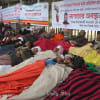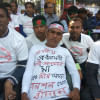Nahid urges non-MPO teachers to end agitation
Education Minister Nurul Islam Nahid today urged teachers and employees of non-MPO educational institutions, who have been demonstrating demanding enlistment under the government's Monthly Pay Order (MPO) facilities, to end their agitation.
“We are fighting for you (non-MPO teachers and employees) to ensure Monthly Pay Order facilities. We have no negligence. Please leave road and return home,” the minister said while replying to a query of reporters at his ministry office in the afternoon.
The minister was talking to reporters after disclosing the result of the JSC and JDC examinations.
“We have already informed the finance ministry in this regard. Once the finance ministry allocates the money, we will sanction it.”

A committee, headed by State Minister for Finance MA Mannan, has already been formed to formulate a policy over the issues of Monthly Pay Order (MPO) facilities, said the minister, adding that the problem will be solved after getting a report from the committee.
Several hundred teachers under the banner of “Non-MPO Shikhya Pratishthan Shikhyak Karmachari Federation” from across the country are continuing their demonstrations for five consecutive days today, demanding enlistment under the government's Monthly Pay Order (MPO) facilities.
They resumed their sit-in programme in front of Jatiya Press Club in Dhaka this morning.
MPO is the government's share in the payroll of the non-government educational institutions. Under the scheme, the government gives 100 percent basic salaries to the teachers of non-government schools. The teachers also get a lump sum amount as other allowances through the MPO.
As per the rules, the educational institutions first come under MPO facilities and then the government enlists the teachers in the payroll.
According to the leaders of the federation, the number of non-MPO educational institutions is 5,242, where around 80,000 teachers are working without any pay, some for more than a decade.
This is because the institutions do not have the ability to pay the teachers while the government stopped bringing these institutions under its payroll for what they said due to a fund crunch.
After a suspension of six years by the then BNP-led alliance government, the Awami League-led government revived the MPO facility in 2010 as per its electoral pledge, enlisting 1,624 private secondary and higher secondary schools and colleges in the MPO scheme.
The rest of the non-MPO teachers have been organising various protest programmes since then.
Currently, more than four lakh teachers and employees of more than 26,340 secondary schools, colleges, madrasas and technical institutes are receiving MPO facilities.

 For all latest news, follow The Daily Star's Google News channel.
For all latest news, follow The Daily Star's Google News channel. 






Comments